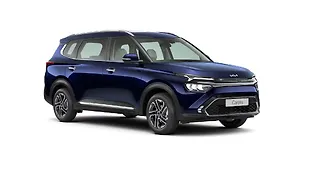What is it?
Why should I buy it?
Styling, refined and potent powertrain, feature-loaded cabin
Why should I avoid it?
Slightly stiff ride, constrained rear-seat space
What is it?

Currently, the sub-four-metre SUV segment in India is the most crowded one. And car buyers are spoilt for choices more than ever before, yet more are coming in. Meanwhile, the Kia Sonet we have here is the newest kid on the block. So, if Kia aims to plunge into this lucrative segment, the Sonet needs to offer something more, something extra, over its rivals. So the question we are trying to answer here is – does the Kia Sonet have that ace up its sleeve?
What we are driving here is the top-spec GT Line in the GTX Plus guise with a diesel-auto.

In terms of dimensions, the new Kia measures almost the same as the rivals. One thing that makes the Sonet standout is its styling. It’s flamboyant, striking, and does grab attention. Our car here is finished in black and yet it doesn’t look understated. Instead, it looks aggressive and stylish and has a subtle predatory stance to it. Look closely and you’d notice the busy grille has some interesting elements, while the sharp LED headlamps look quite upmarket. Adding to it is the Kia Stinger like tail lamps which are wedged-out on the tailgate.

The floating roof effect is joined by the interesting black element wrapped around the C-pillar, making the rear-windscreen appear quirky. That said, we liked the right amount of chrome garnish used all around. And the red accents on this GT line add to the sporty appeal. It rides on the 16-inch alloy wheels and we think they could have been more stylish to complement the otherwise flashy exterior. Lastly, we can look past the faux exhaust design, because of the diffuser fins present lower down the bumper.
Overall, the Kia Sonet sets a new benchmark with its design and should appeal to those who like to flaunt their rides.

How is it on the inside?

Step inside and the Kia Sonet welcomes you with a refreshing cabin layout. Its Seltos-like console integrating the infotainment system and the driver’s display looks expensive. And the quality of material used all around the cabin feels premium too. Even the mixture of piano-black, brushed silver, and red accent inserts make the cabin appear busy and engaging. Look at the centre console and you’d find two smartphone trays there. The one tucked below the console is for the wireless charger, so you won’t be able to see the phone’s display while it’s charging.

We liked the tactile feel of all the buttons – be it for the air-con unit or on the steering wheel. This flat-bottom steering in the GT line isn’t meaty but feels nice to hold. Behind it, the digital instrument cluster has analogue dials pushed away on either side, similar to something you’d see in the Creta. But unlike the Creta’s, the needles on these dials are extremely small and are difficult to see (especially the tachometer on the move).

And we think, the digital meter in the middle could have utilised the space better. Meanwhile, the touchscreen – as we have experienced in the Seltos – is smooth, intuitive, and easy to navigate. But physical buttons placed below it, instead of the touch panel, could have been easier to use, especially when driving.

Along with good support, the driver's seat is also manually adjustable for height. And though the steering only adjusts for rake and not reach, finding a suitable driving position isn’t difficult. With sorted ergonomics and thin A-pillars, the visibility outside is fairly good too. In terms of practicality, you get two cup holders and a couple of bottle holders on the doors. But the armrest storage holds nothing more than a few cards or a wallet, owing to the intrusive air purifier placed below it.

Moving to the rear seats, the bench has good back support on offer but could have done better with some under-thigh support to feel more comfortable. While the scooped roof helps with ample headroom, legroom is just about adequate. Accommodating three here won’t be a comfortable affair either, thanks to the tight shoulder room. Rear occupants get AC vents, a USB charger, a phone holder, armrest with cup holders, and adjustable headrests. On the flip side, there’s no split-fold for the rear seats. Meanwhile, the boot space of around 392 litres can hold up large suitcases, couple of duffle bags, and will still have room to spare.

Not only is the Kia Sonet’s cabin a nice place to be in, but it is also one of the most feature-loaded one in the segment. Standout features include – six airbags, ventilated seats, UVO connected car tech with voice commands, integrated air purifier, seven-speaker Bose music system, mood lighting, TPMS, and drive/traction modes. You can have a look at a detailed, variant wise feature list by clicking here.
How does it drive?

When launched, the Sonet will be available with three engines and five gearbox options. What we are driving here is the BS6-compliant 1.5-litre CRDi diesel which also does duty in the Seltos. And we have the six-speed automatic – which is a six-speed torque converter – so the power output is rated at 115bhp at 4000rpm, and 250Nm is available between 1500-2750rpm. Crank up the motor and the diesel impresses with its refined and vibration-free nature. There’s no clatter heard inside the cabin at all.

Slot the lever into D and let go of the brake pedal, and the Sonet inches ahead with ease and relative smoothness. Get on the gas and the going gets progressive with the gearshifts being seamless, quick, and absolutely jerk free. There’s enough low-end grunt to drive around the city limits without any hassle but for quick overtakes there’s a slight lag that disappears only if the engine is in the sweet mid-range. Keep the motor between 2200-3500rpm and it performs best here in a linear manner, albeit with slight engine noise filtering inside the cabin.

On full bore acceleration, triple-digit speeds arrive quickly with the gearbox hitting the rev-limit at 4000rpm before upshifting. Also admirable is that - even when hurried, the torque converter goes about doing its job without even letting you feel the upshifts. Maintaining triple-digit speeds on highways doesn’t strain the motor either. As for the fuel efficiency, the carmaker claims 19kmpl of this diesel-auto.

Now Kia is offering three driving modes – Eco, Normal, and Sport – with the Sonet. In the Normal mode, the throttle feels pretty normal. It’s only when you shift to the Sport mode that the difference is noticeable. The throttle sharpens a tad bit and you can hear the engine more than usual. Then shift to Eco mode and everything is dialled-down. Although the difference felt while driving between the three modes is fairly minuscule, it does add to the drama.

As for the steering, we found it to be well weighted, going two and a half turns lock-to-lock. Although it isn’t very engaging, and sometimes feels overly assisted, it is fairly direct and does inspire confidence if you want to drive around enthusiastically. Even with a slightly stiffer setup, the Sonet does manage to absorb bad roads and irregularities without discomforting the occupants. Over the sharp-edged potholes and on-road joints, the Sonet holds its composure well. At low speeds, you’d feel the irregularities inside but never does it get uncomfortable at any point. Out on the highway, the ride remains pliant too. Overall, Kia has managed to strike a good balance in the way the Sonet rides.

Overall, at city commutes, the Sonet feels nice and stress-free to drive, thanks to its easy controls. And its highway manners are commendable too.
Should I buy one?

With the Sonet, Kia aims to take on the well-established players, some of which have been around for half a decade now. Yet the Sonet appears to have plenty of tricks up its sleeves. Firstly, its flamboyant styling stands out over its competition. It scores well on the built quality and the fairly comfortable cabin is filled to the brim with features. There are no less than five powertrains across 17 variants to choose from. Lastly, it also drives well, thanks to its refined and potent motor and well-sorted dynamics. If the Korean carmaker manages to price the Sonet right, say between Rs 7-11 lakh (ex-showroom), we think Kia has a winner in its hand. And it will certainly be giving sleepless nights to the competitors.
What’s more, of the five powertrain options, we have also driven the 1.0-litre iMT version. Be sure to come back tomorrow to read about it.
Where does it fit in?

When launched, the Kia Sonet will take on the likes of the Maruti Suzuki Vitara Brezza, Hyundai Venue, Tata Nexon, Mahindra XUV300, and the Ford EcoSport apart from the upcoming Toyota Urban Cruiser and Nissan Magnite in the sub-four metre SUV segment.
Pictures by Kapil Angane

![Kia Sonet [2020-2022] Front View Kia Sonet [2020-2022] Front View](https://imgd.aeplcdn.com/642x361/n/cw/ec/50138/kia-sonet-front-view0.jpeg?wm=1&q=80)
![Kia Sonet [2020-2022] Right Front Three Quarter Kia Sonet [2020-2022] Right Front Three Quarter](https://imgd.aeplcdn.com/642x361/n/cw/ec/50138/kia-sonet-right-front-three-quarter32.jpeg?wm=1&q=80)
![Kia Sonet [2020-2022] Right Front Three Quarter Kia Sonet [2020-2022] Right Front Three Quarter](https://imgd.aeplcdn.com/642x361/n/cw/ec/50138/kia-sonet-right-front-three-quarter208.jpeg?wm=1&q=80)
![Kia Sonet [2020-2022] Right Front Three Quarter Kia Sonet [2020-2022] Right Front Three Quarter](https://imgd.aeplcdn.com/642x361/n/cw/ec/50138/kia-sonet-right-front-three-quarter227.jpeg?wm=1&q=80)
![Kia Sonet [2020-2022] Right Front Three Quarter Kia Sonet [2020-2022] Right Front Three Quarter](https://imgd.aeplcdn.com/642x361/n/cw/ec/50138/kia-sonet-right-front-three-quarter232.jpeg?wm=1&q=80)
![Kia Sonet [2020-2022] Right Front Three Quarter Kia Sonet [2020-2022] Right Front Three Quarter](https://imgd.aeplcdn.com/642x361/n/cw/ec/50138/kia-sonet-right-front-three-quarter236.jpeg?wm=1&q=80)
![Kia Sonet [2020-2022] Right Front Three Quarter Kia Sonet [2020-2022] Right Front Three Quarter](https://imgd.aeplcdn.com/642x361/n/cw/ec/50138/kia-sonet-right-front-three-quarter233.jpeg?wm=1&q=80)
![Kia Sonet [2020-2022] Right Side View Kia Sonet [2020-2022] Right Side View](https://imgd.aeplcdn.com/642x361/n/cw/ec/50138/kia-sonet-right-side-view222.jpeg?wm=1&q=80)
![Kia Sonet [2020-2022] Image Kia Sonet [2020-2022] Image](https://imgd.aeplcdn.com/272x153/n/cw/ec/41523/sonet-exterior-right-front-three-quarter-110.jpeg?q=80)
























